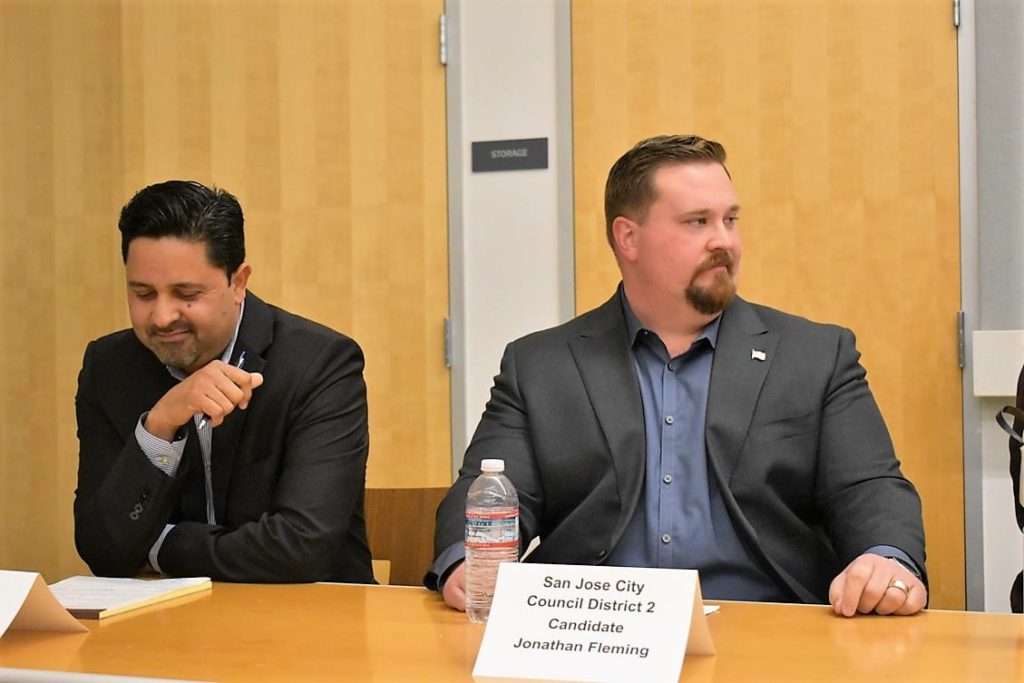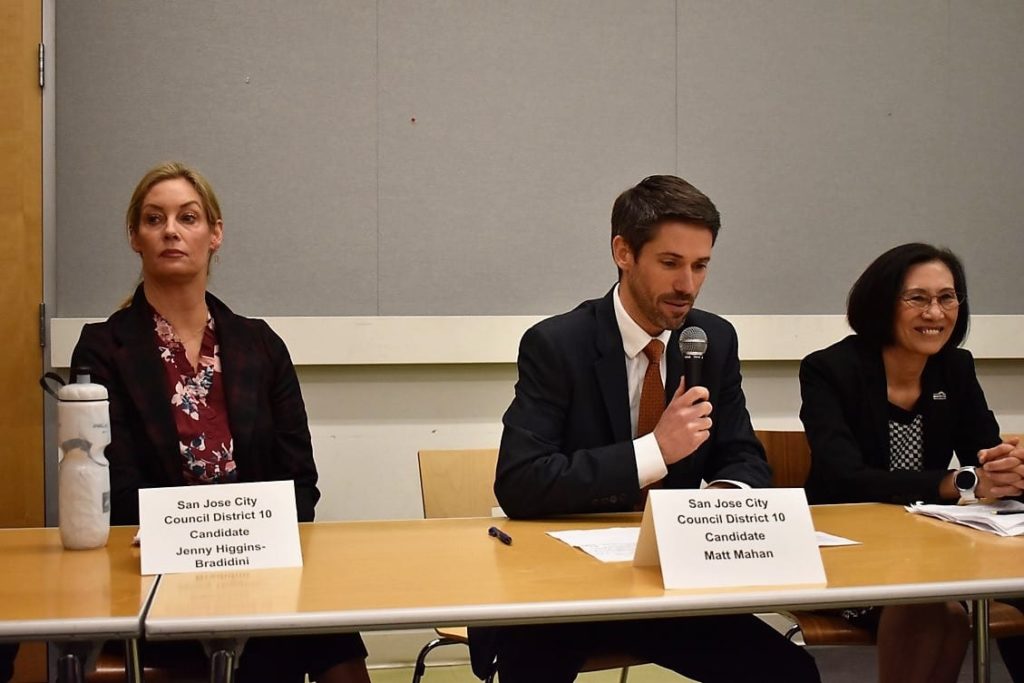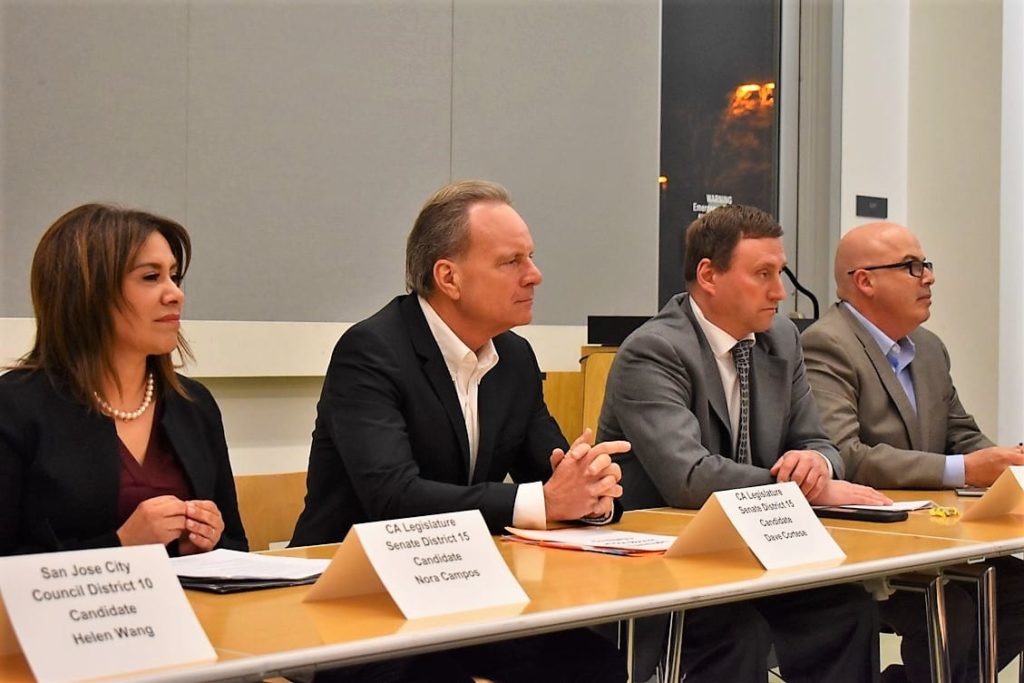A slew of Silicon Valley candidates vying for seats on the San Jose City Council and state Senate shared their views on housing, homelessness and public safety at a forum held last week at the Santa Teresa Public Library.
The candidates were each allotted six minutes to speak during the forum, hosted by Santa Teresa Foothills Neighborhood Association, providing more in-depth answers than the typical 30-second responses.


San Jose City Council District 2
Candidates: Councilmember Sergio Jimenez, Jonathan Fleming
Jonathan Fleming, who is challenging Councilmember Sergio Jimenez, kicked off the forum by saying he believes “it’s time for a change” in the South San Jose district.
“We’re worse today than we were three years ago,” Fleming said, adding that homelessness has risen 52 percent, crime is up 20 percent and residents are leaving the state because of the high cost of living. Linking homelessness with mental illness and drug and alcohol abuse, he advocated for treatment, job training and placement.
Fleming also called for more police officers, saying people don’t feel safe.
Jimenez, meanwhile, pointed to a number of city programs to build more affordable housing and help people get off the streets. The councilman didn’t dispute a rise in crime, but pointed to his efforts to increase police presence in the district.
Jimenez allocated $2 million for opening the police substation in South San Jose, saying it’s one of his primary goals. He used part of his $4 million in budget allocations to provide a computer center for seniors at Southside Community Center and distributed $60,000 in grants to neighborhood associations.
He also said he’s proud that District 2 provided leadership to secure and preserve about 1,000 acres in Coyote Valley into perpetuity.
“I sincerely believe that if I hadn’t been elected … someone supportive of preserving that open space, we wouldn’t have that today,” he said.


San Jose City Council District 10
Candidates: Jenny Higgins Bradanini, Matt Mahan, Helen Wang
San Jose Women’s March founder Jenny Higgins Bradanini, one of three candidates vying for the open seat in District 10, expressed passion for reducing homelessness and sorrow for striking and killing a 66-year-old man while driving her SUV in December.
“As many of you know, I was involved in a tragic accident in December and my heart, my prayers, and my mind is with his family,” she said.
Higgins Bradanini said her love for her community and desire to improve San Jose’s future hasn’t wavered.
“With the rate of homelessness and displacement going up, and housing costs skyrocketing …we need more affordable housing options and to rescue our neighbors living on the streets and in their cars,” she said.
Higgins Bradanini also said she values fiscal responsibility and will carefully invest the city’s financial resources. She is not supporting Measure E, the proposed property transfer tax, because of her frustration with the city waiving fees and offering subsidies for downtown high-rise developers.
Businessman Matt Mahan, meanwhile, expressed concern with the high cost of housing, homelessness, traffic congestion, crumbling infrastructure, property crime and a housing imbalance.
“The county added eight jobs for every one housing unit we’ve built,” he said, “so, working-class people are pushed out as more workers come here and compete for the same limited stock of housing.”
Mahan advocated for greater housing density near transit, saying that sprawl only worsens traffic and air pollution. He also favors building long-term facilities for people suffering from mental illness.
“I did a police ride-along and saw the revolving door of picking people up, dropping them off at Valley Med,” he said. “They’re there for up to 72 hours just to get hydrated and they’re right back on the street. It’s costing us tens of thousands of dollars a year per homeless person and we’re not making their lives any better.”
On city finances, Mahan supports annual audits and self-contained, self-funding pension liability.
Helen Wang, a nurse and businesswoman, favors limiting the red tape and taxation for businesses, helping the homeless and adding police to boost public safety. She also suggests using St. Louise Regional Hospital as a mental health facility or rehab location for homeless residents while also offering job training.
“We need to fix the problem rather than just moving homeless people from location to location,” Wang said. “Or putting the mentally ill in jail.”


State Senate District 15
Candidates: Nora Campos, Dave Cortese, Tim Gildersleeve, Johnny Khamis
Four candidates vying to replace Sen. Jim Beall in Senate District 15 also faced off during the forum. Candidates Ann Ravel, Robert Howell and Ken Del Valle.
Former Assemblymember Nora Campos said public safety has been a hallmark of her political career, touting her push to increase police staffing on the San Jose City Council and her time serving as a public safety chair in Sacramento.
“Public safety truly is a priority for me,” she said.
Campos also prioritizes affordable housing, suggesting tiny homes as a solution and authoring a bill, AB 2176, that eased building codes to allow constructing the backyard homes. The small dwellings, combined with mental health counseling and job training, can help get struggling individuals back on their feet, she said.
Santa Clara County Supervisor Dave Cortese said he’s the best candidate to serve in the state Senate because of his longstanding work in the South Bay.
In 2000, Cortese worked with the late San Jose Vice Mayor Pat Dando to help pass Measure P, which paid for San Jose’s community centers. In 2002, he chaired the public safety bond campaign responsible for additional fire stations and the police substation.
On the Board of Supervisors, Cortese led the campaign for Measure A, which authorized the county to issue up to $950 million in general obligation bonds to fund housing for the homeless. He said the measure included $700 million for extremely low-income housing, funding 2,000 units for the homeless.
“We’ll have three times as many before we’re done,” he said.
Cortese also considers himself a leader on environmental issues, speaking last year at the United Nations and delivering a call to action for local governments around the world to address climate change.
Tim Gildersleeve said he views housing as a human right and unions as a tool to combat economic inequality. He favors tuition-free education, universal health care and taxes with accountability.
“I have a brother who is mentally ill, living in a locked facility,” he said. “If not for community taxes, my brother wouldn’t be in a safe place.”
To help the homeless, Gildersleeve would sanction tent encampments and transitional housing with social services for people with mental illness or drug and alcohol addiction.
Fiscal responsibility is key for San Jose Councilmember Johnny Khamis, who terms out from his District 10 seat this year.
Frustrated with how City Hall managed money when it cut library and park hours, and services, was motivated to join the political arena.
During his first year on the City Council, Khamis said he saved the city a million dollars by consolidating leases on unused buildings and requesting a VTA audit that uncovered 200,000 unverifiable trips, at a cost of $3 million a year during the three years they were audited.
Today, Khamis is frustrated with how the state is spending residents’ tax dollars.
“We never paid more money in taxes, but our streets are getting more deteriorated, there are more criminals on our streets, a lot more homeless, and the price of housing keeps going up,” Khamis said. “Something has to change on the Senate level and I’m going to be that voice for change.”
To address the homeless crisis, Khamis said he would house people on properties owned by the state, implement Laura’s Law to compel certain mentally ill people to get treatment and mandate drug rehabilitation for people leaving prison.
Contact Almaden Times Senior Staff Writer Lorraine Gabbert at [email protected].



Leave a Reply
You must be logged in to post a comment.